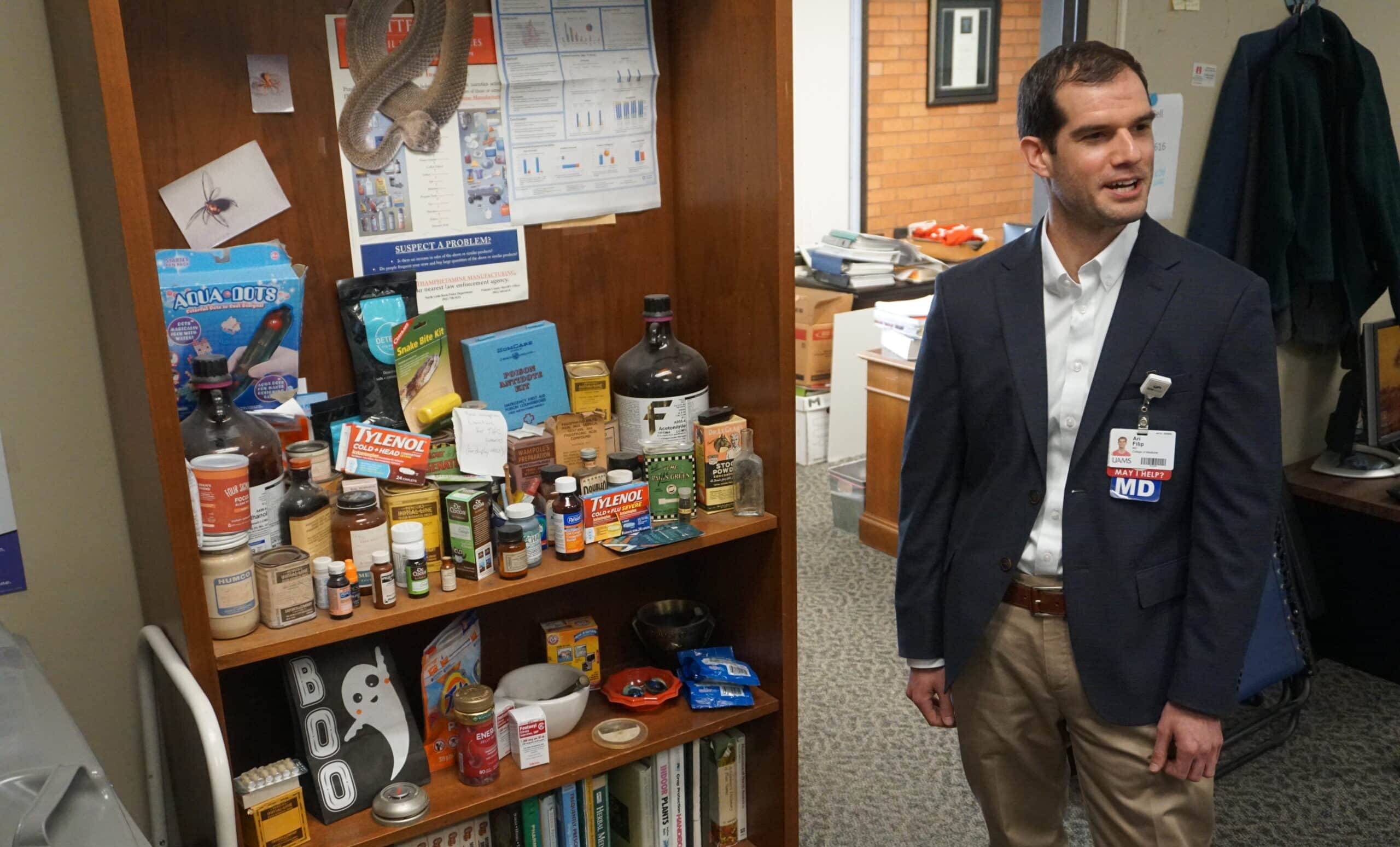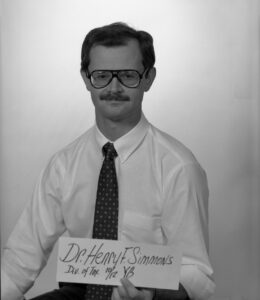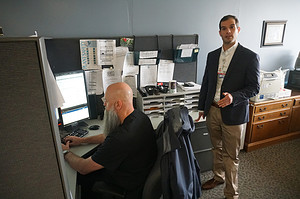View Larger Image

Ari Filip, M.D., the center's medical director, stands in front of a shelf containing common and uncommon items that can cause poisoning. The center celebrates its 50th anniversary this year.
Image by Benjamin Waldrum
50 Years Later, Prevention Still Key for Arkansas Poison and Drug Information Center
| In 1973, the UAMS College of Pharmacy created the Arkansas Poison and Drug Information Center — a free, statewide resource to supply rapid, sophisticated and up-to-date poison and drug information. Fifty years later, that mission still resonates just as strongly.
“A centralized poison center for the state of Arkansas began as an idea over 50 years ago,” said Ari Filip, M.D., the center’s medical director. “In the decades since, it has evolved into a 24/7 service for all 3 million Arkansans, also providing comprehensive poison and drug education. I am proud to be a part of this institution.”
Last year, the center received reaccreditation from the American Association of Poison Control Centers for a full seven years.
The ongoing efforts of the Arkansas Poison and Drug Information Center and its tight-knit team started small, at first.
History and Growth
In 1973, Arkansas had seven poison treatment centers at various hospitals around the state, serving only their communities or counties, and there was a clear need for an easily accessible statewide resource. After discussions with the UAMS College of Pharmacy, the center began operation in June that year with a staff of five or six.

Henry “Hank” Simmons Jr., M.D., Ph.D., shown here in 1988, was the center’s first and longtime director. Simmons stepped down from that role last year.UAMS Historical Research Center
Three years after the center’s founding, Karrol Fowlkes, Pharm.D., then an assistant professor in the College of Pharmacy, authored a presentation on the college’s role in poison and drug information centers. At the time, these two roles were rarely combined. Fowlkes argued that they would work well together, and that colleges of pharmacy were ideal candidates to run such centers.
“A college of pharmacy can operate in both capacities with great expertise,” Fowlkes wrote. “The need for immediate, up-to-date information concerning the toxicity of and treatment for the mushrooming number of commercial products is readily apparent. … The college of pharmacy poison and drug information center can and should provide an excellent outreach program for the college itself, as well as for the working pharmacist.”
Today, the Arkansas Poison and Drug Information Center has a staff of 16: seven pharmacists including its managing director, five nurses, three physicians and one poison educator for public health outreach and education. The vast majority of staff work for the center full-time, Filip said.
Filip is only the second medical director in the center’s history. The first, Henry “Hank” Simmons Jr., M.D., Ph.D., stepped down from that role last year, after decades of shepherding the center’s growth. He often found creative ways to remain on-call, such as taking a satellite phone with him while hiking, said Howell Foster, Pharm.D., the center’s managing director.
“The center is what it is today because of him,” Foster said. “Hank was the only practicing board-certified medical toxicologist in Arkansas for almost three decades. During that time, he taught more state health care professionals medical and clinical toxicology than anyone in the history of the state, which is definitely a legacy in itself.”
“Dr. Simmons is the main reason I am back here in Arkansas,” Filip said. “He was a role model for the type of physician I wanted to become: smart, principled and reliable. I could not be happier to be back, though it would be hard to imagine filling his shoes.”
Evolving Needs, Same Message
Over the years, some things about how the center assists the public has changed, but its core mission remains the same, said Erica Liebelt, M.D., the center’s associate medical director.
“The role of poison centers has evolved significantly in that we really are an integral part of the public health system, in terms of emergency preparedness and response,” Liebelt said. “It’s also less well-known that poison centers aren’t just for children. The older adult population has been a focus for us too in terms of medication safety and inadvertent exposures.
“But our messaging has never changed. It’s the same message that we had 40 years ago, and that’s prevention.”

Filip speaks as Todd Nolte, Pharm.D., CSPI (seated), completes a call. The center has grown from a staff of five or six experts to 16 today, including pharmacists, nurses, physicians and one poison educator.Benjamin Waldrum
In 2021, the center logged calls for more than 20,000 human exposures, with 9 of every 10 exposures happening at home, according to data from America’s Poison Centers. Most of those cases were treated at home following the advice of poison center experts.
Poison centers commonly field calls about mistakes with medications — doubling a dose, taking the wrong medications or having unusual reactions. Accidental exposures to chemicals and household items like cleaning items, creams and beauty products are also common.
Calls in Arkansas generally follow national trends. For example, opioids such as oxycodone, heroin and fentanyl have increased over the last 20 years. In recent years, the center has seen a large increase in calls for accidental ingestion of button batteries and cannabinoids. One area Arkansas differs from many other states is snakebites, with about 100 calls each year, Liebelt said.
The COVID-19 pandemic caused a major spike in calls for centers nationwide. A troubling recent trend is intentional overdoses among adolescents, increasing in part due to the mental health crisis. “As a pediatrician, it is nothing like I’ve ever seen in my career,” Liebelt said.
Keeping people calm in a crisis is one of the team’s top priorities.
“All of our staff get specialized training in how best to communicate,” Liebelt said. “Over the phone, it’s not like you have the patient in front of you. Learning how to communicate the appropriate information and provide reassurance is a big part of a poison information specialist’s job.”
Just a Phone Call Away
Today, the Arkansas Poison and Drug Information Center is finding other ways to expand its services to the public.
Recently the center added a consult service for UAMS Medical Center, seeing patients in the emergency department and throughout the hospital, Filip said. Regular contact with the Arkansas State Medical Examiner’s Office helps both parties to better understand poisoning and drug-related deaths across the state. There are also plans underway for additional collaborations and research.
As it has been for half a century, the center is just a phone call away at 1-800-222-1222. A certified specialist in poison information is available 24 hours a day.
“There is no harm in calling us if you think you may have been exposed to a drug, toxin or venom,” Filip said. “We have seen over time that we can save a lot of unnecessary visits to ERs by just giving us a call and talking through your concerns.” He added that people experiencing life-threatening symptoms should visit an ER or call 911 immediately.